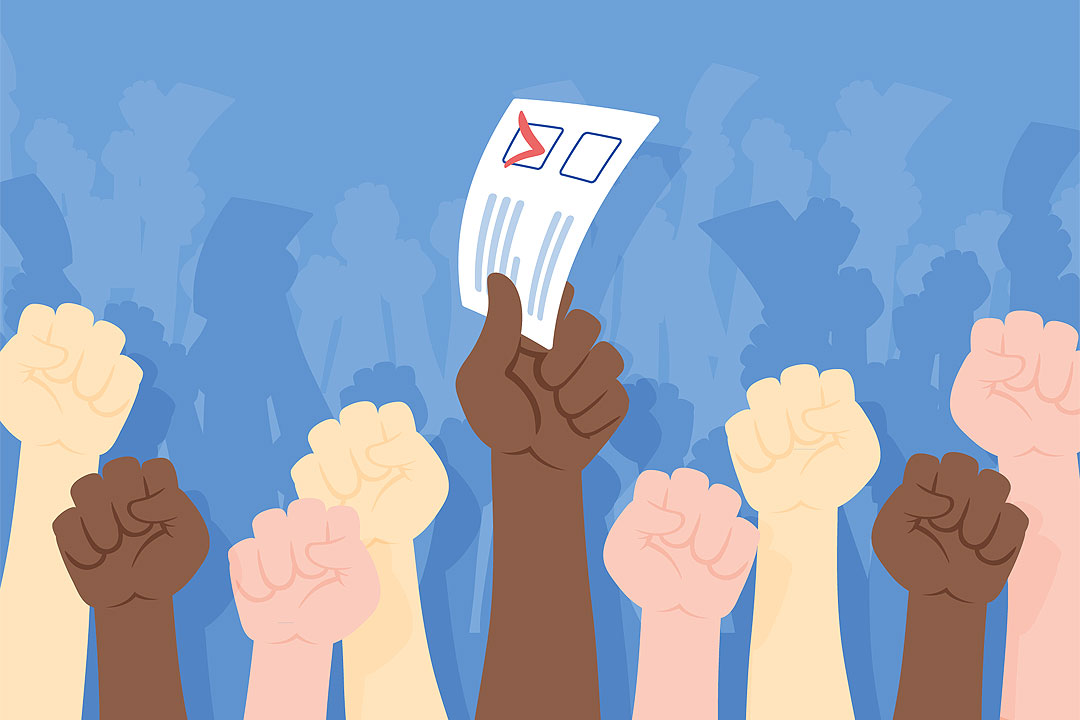
Being Right
By Jemy Gatdula

The concept of “choosing the lesser evil” seems to say that when a person is faced with two undesirable (i.e., two unfortunate or disappointing) options, then that individual should choose the less “evil” thing. But that framework, which at first glance looks like a mere comparative exercise, is actually complicated.
THERE IS AN EVIL
First of all, to say there is a lesser evil is to acknowledge there is an “evil.” Which indicates there is an identifiable and preferred good. And equally importantly, a lesser evil indicates the presence of a hierarchy. All of which points to the presence of values and principles that, if one truly places importance to them, must then be adhered to consistently.
Or, put another way, how does one identify what is evil? And then determining what makes something a lesser evil than another? What value or weight does one put on particular acts to enable people to compare evils? That requires an objective moral code, which cannot be selectively or randomly applied. To condone corruption is evil. But what about supporting measures that break up marriages or the family? State sponsored killings are clearly evil. But so is supporting abortion legislation.
Another and more obvious aspect of choosing the lesser evil is that one actually admits to choosing an evil, albeit justified ostensibly for it being considered as “lesser.” But how does that jive with the idea of having a declared set of values and principles supposedly adhered to? The point is, if one considers “x” to be evil, then to choose “x” simply because it seems to be a lesser evil than “y” does not change the fact that they’re both still evil.
Oxford moral philosopher Bernard Williams certainly thought so. “Take one of Williams’s most famous examples: Jim, an explorer, stumbles into a scene where 20 people are condemned to be executed. Because Jim is a venerable guest, the executioner offers to free all but one of the condemned, if Jim wants the honor of killing that one; if Jim refuses, all 20 will be killed. The condemned beg Jim to kill one of them. For utilitarians (the specific targets of Williams’s critique), it doesn’t matter that Jim has to kill someone — what matters is that either 20 people will die, or one will die, and it is far better that only one dies. Williams’s point was that it clearly does matter, especially to Jim, that to secure this optimal state of affairs Jim has to kill somebody.
“What we do matters to us, and this is often very significant. In doing the lesser of two evils, perhaps we lose something, perhaps we harm someone, perhaps there is something “distressing or appalling” — such as in Jim’s case — or even just a little off about what we do, or perhaps it simply is not the sort of thing done by “honorable and scrupulous people.” The point is that even if it is the best option, the lesser of two evils can still be genuinely evil and we can be averse to doing it.” (“The Witcher and the lesser of two evils,” Jake Wojtowicz, Jan. 17, 2020).
STICKING TO PRINCIPLES
Translated to the coming elections, if one really is intent in bringing about real positive change democratically (and democratically is the only legitimate and pragmatic avenue for positive change), then, as Witherspoon Institute’s Robert Simpson puts it, “it isn’t enough to simply promote the good within the limited range of choices you’re being offered. You need to try to become someone who actively builds those choices, shaping which outcomes result from which actions. And that means taking on projects and principles that you mean to live by — even if this might produce undesirable outcomes in the short term.” (“When is it ethical to vote for ‘the lesser of two evils’?,” Oct. 28. 2020)
It is also be true that to indulge in lesser evil decision making is to fall into the fallacy of false dichotomy. Of self-limiting to two, binary, choices when there are other choices actually available. That some refuse to look at other options just so they can justify the lesser evil framework doesn’t really speak well of people’s decision-making capability and maturity. Rationalizing one’s refusal to vote for a better candidate by saying such candidate is unwinnable is likely engaged (consciously or not) in mere wish fulfillment.
WITHOUT INTEGRITY, NOTHING MATTERS
In the end, if voters want political leaders with integrity then the voters must act with integrity themselves. One can’t demand of others what one is unwilling to practice. To pronounce upon virtues, values, and principles, religious beliefs or doctrines, and then to abandon such for short-term political gratification is frankly jejune.
And really, any political candidate or his/her supporters that seek to brush off a candidate’s flaws by blithely saying that such candidate is at least the “lesser of two evils” is simply being lazy, hypocritical, and ultimately unworthy.
“Fully conscientious voting will surely require the virtue of practical wisdom, the exercise of which cannot be encapsulated in a simple proposition. We can say, at least, that voters should not let their votes be taken hostage by someone situated to spurn— without substantial consequences — their support. My conclusion, then, somewhat converges on Alasdair MacIntyre’s, formulated 12 years ago: a voter should be prepared to opt out of a system that presents him with intolerable alternatives.” (“Now Is the Time: Why We Must Refuse to Vote for the Lesser of Two Evils,” Gregory Brown, Aug. 9, 2016)
Admittedly, politicians have been known to say one thing during the campaign and then do another once in office. Yes, perfect candidates do not exist. Because no perfect human being exists. Yet, the voter can look at that person’s character. And if a candidate with decidedly confused morals, absent values, and vulgar character is elected, then what does that say of the voter?
Elections are not there simply to put a person in public office. It is also the voters’ opportunity to stand for the issues, causes, and beliefs that he holds most dear. From there, elect the person with the necessary experience, education, competence, and character that more or less ensures the winner adheres to and advances those issues, causes, and beliefs.
So, it’s also about accountability. While voters make a big deal of holding politicians to account, nevertheless, if the voters themselves abandon their beliefs or causes (e.g., protect national sovereignty and territory, uphold the traditional family, to be against divorce or same sex “marriage” or abortion) simply to go along with the bandwagon, then the voters will truly only have themselves to blame for whatever happens to the country.
Jemy Gatdula is a senior fellow of the Philippine Council for Foreign Relations and a Philippine Judicial Academy law lecturer for constitutional philosophy and jurisprudence
https://www.facebook.com/jigatdula/
Twitter @jemygatdula